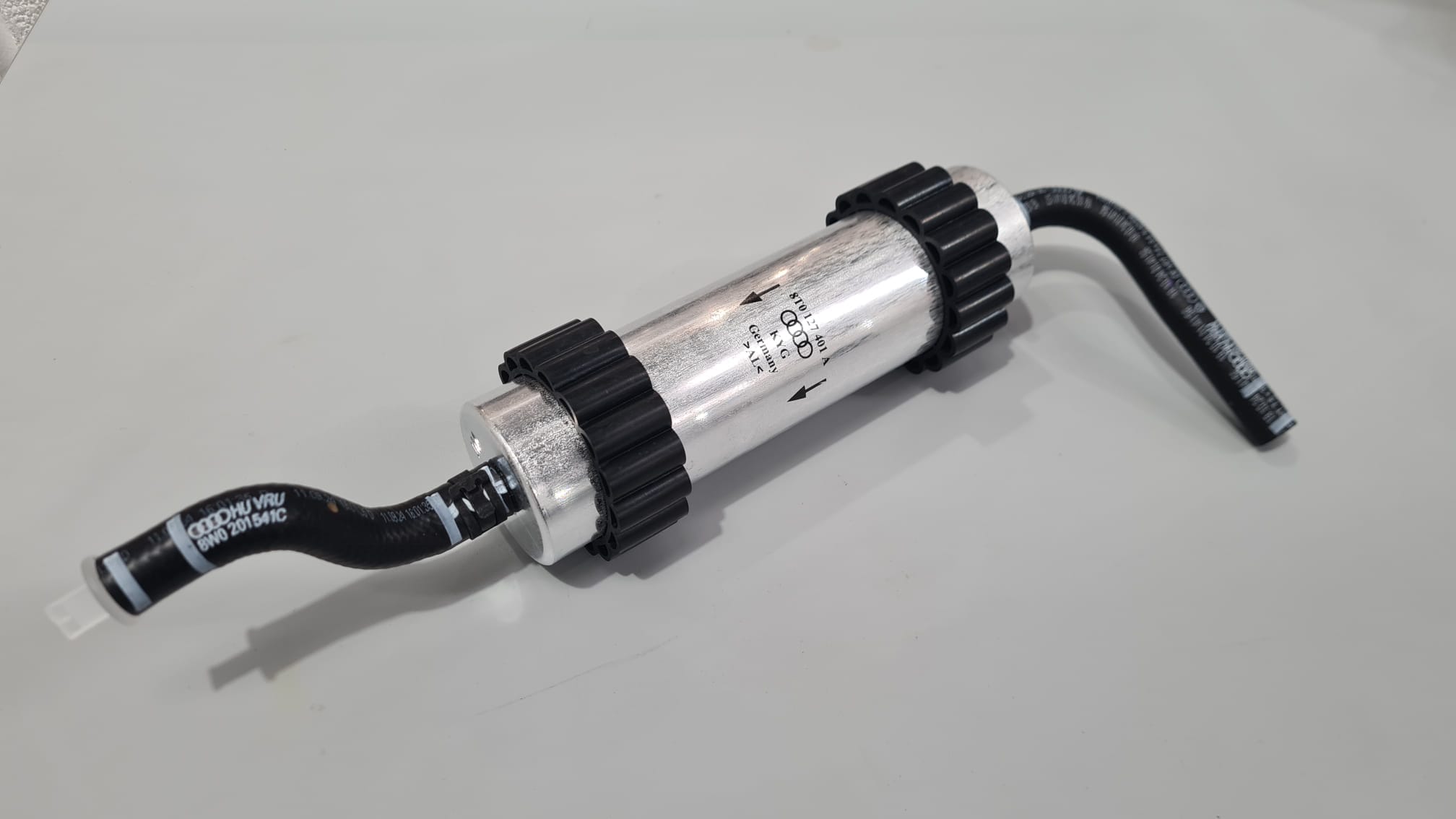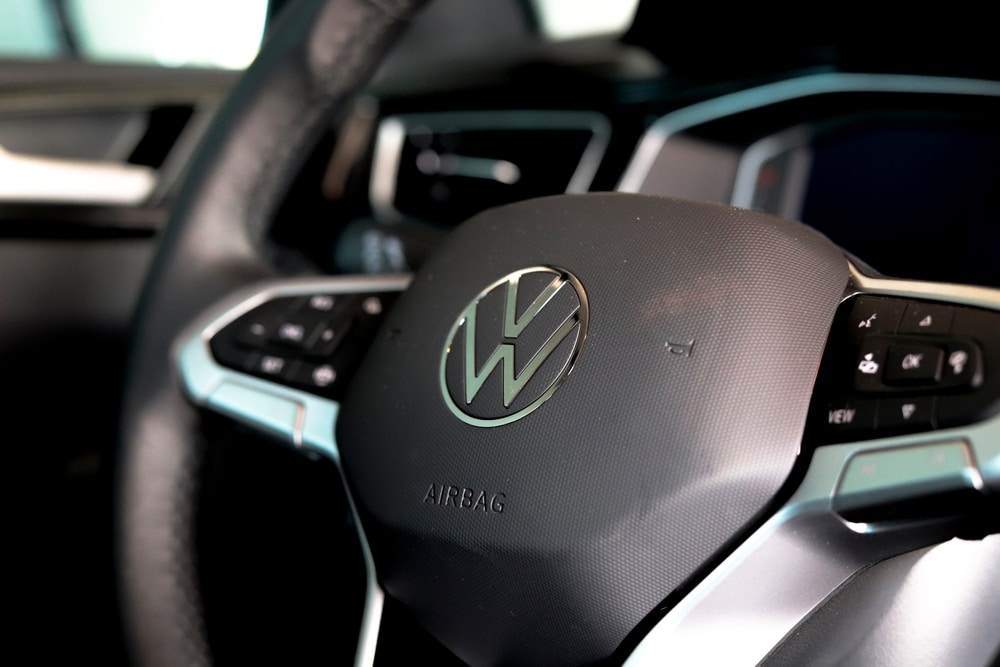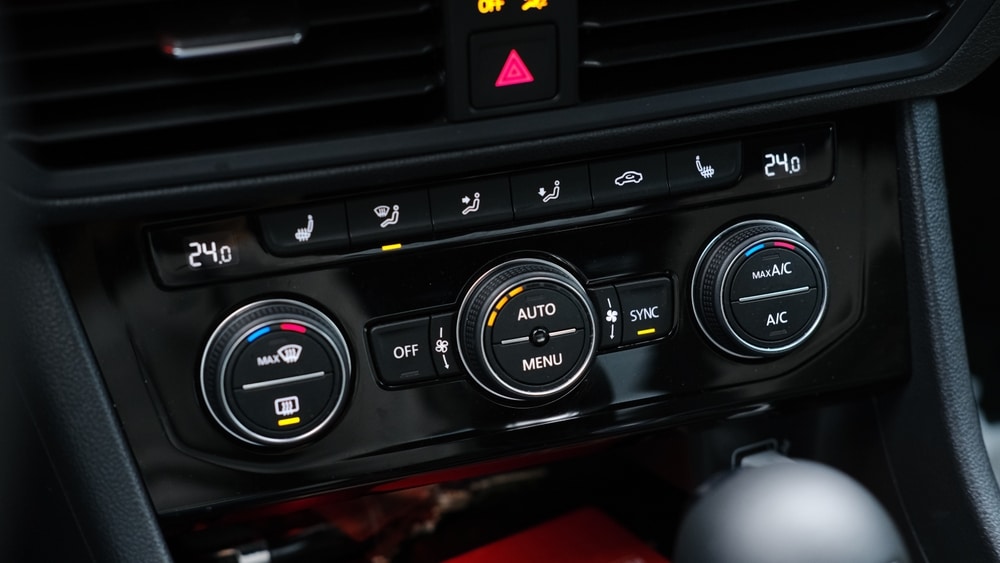Diesel Fuel Filter
Could one small filter really hold the key to preventing breakdowns and high repair bills?
Your diesel fuel filter is designed to protect your vehicle’s fuel system every time you start the engine. Neglect it; the outcome can quickly move from minor hesitation to major faults that hit your wallet hard.
And it can sometimes leave you with a repair bill in the thousands. Talk about a nightmare.
In this guide, you’ll uncover where the diesel fuel filter is fitted, what it does, the different filter types, and the issues that arise when it’s not maintained. Most importantly, you’ll understand why keeping up with replacement is one of the best ways to safeguard your diesel engine and avoid unexpected costs.
Wondering when your diesel fuel filter was last changed?
Book your diesel service at CSN Autos, Wymondham, today, and benefit from our award-winning expertise. Call 01953 425983 to arrange your appointment.
Where is the diesel fuel filter located in your vehicle?
Your vehicle’s diesel fuel filter is installed in the low-pressure section of the system, identified as part 4 in the diagram, between the fuel tank and the high-pressure pump. On most modern diesel cars, it’s located in the engine bay, where it’s easier to service.
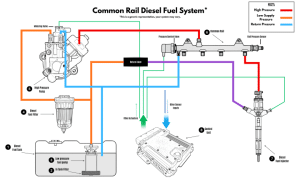
In addition, most vehicles also have a built-in tank strainer, noted as part 2 in the diagram. This isn’t a serviceable item but shields the pump from larger particles.
For a clearer understanding of how the whole system operates, check out our Diesel Fuel System Guide, which shows how each component works together.
What does the diesel fuel filter actually do?
The diesel fuel filter’s role is to shield your vehicle’s fuel system from contamination. It does so by carrying out these essential tasks:
- Capturing particles: The diesel fuel filter traps fine debris and other contaminants suspended in the fuel before they reach the high-pressure pump and injectors. Without this protection, particles can cause wear, blockages, or performance issues, often leading to expensive repairs.
- Separating moisture: Diesel naturally contains small traces of water, which the diesel fuel filter removes before they can circulate through the system. If not dealt with, this moisture can lead to corrosion throughout the fuel system in areas such as the pumps and injectors, creating serious and costly damage over time.
By carrying out these functions, the diesel fuel filter acts as a vital safeguard for your engine’s performance.
Regular fuel filter replacement is a key part of preventative maintenance; book your service with CSN Autos, Wymondham today to keep your vehicle running at its best.
Different types of diesel fuel filters explained
The main diesel fuel filter (part 4 in the diagram) plays a vital role in most modern diesel vehicles, but the filter design your vehicle uses can differ.
The two most common types are:
- Sealed filter units: In some systems, the filter comes as a fully sealed canister, with both housing and media replaced together. This style is more typical of older or heavy-duty diesel applications, and certain versions include added features such as water separation layers or built-in drain bowls.
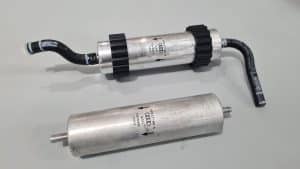
- Cartridge modules: This design is widely used in today’s diesel cars. A permanent plastic or aluminium housing remains in the engine bay, while a pleated, multi-layer filter element sits inside. The element is responsible for capturing particles and separating water, and the housing may also contain features such as valves, sensors, or even a hand primer. Only the inner element is changed during a service, keeping the housing in place.
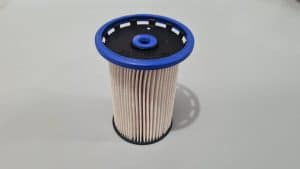
Alongside the main filter, many vehicles also use a coarse strainer inside the tank (part 2 in the diagram), which helps trap larger debris before it reaches the low-pressure pump or filter.
Routine servicing is the most reliable way to ensure whichever filter type your vehicle uses continues to protect your engine from contamination and costly failures.
Book your diesel service with CSN Autos, Wymondham, today by calling 01953 425983.
Problems caused by diesel fuel filter faults
When the diesel fuel filter develops a fault, several issues can arise:
- Diesel fuel filter restriction: A blocked diesel fuel filter lowers fuel flow, reducing performance or a no-start.
- Clogged strainer: Forces the pump to work harder, causing noisy operation or intermittent fuel supply.
- Water contamination: Water that isn’t removed can cause corrosion throughout the diesel fuel system, which could damage the injectors and pump.
- Air leaks: Seals that are damaged or fitted incorrectly let air in, leading to stalling or long cranking.
- Incorrect fitment: Using the wrong diesel fuel filter or misfitting seals may lead to leaks or unfiltered diesel reaching the rest of the fuel system.
Does your diesel vehicle have a problem? Speaking to an expert can give you peace of mind.
Replacement intervals for diesel fuel filters
There isn’t a single set interval for diesel fuel filter replacement. The correct timing is always based on the manufacturer’s servicing schedule, so following their guidance is essential.
Key things to keep in mind:
- Correct filter choice: Always install the filter design specified for your vehicle – whether cartridge or sealed.
- Diesel fuel filter quality: Not all filters are built to the same quality. Inferior parts may restrict fuel flow, allow fuel leaks, or fail to separate water effectively, leaving your system vulnerable.
- Priming the system: After a new filter is fitted, the system must be correctly primed using the vehicle’s pumps or a built-in hand primer. Skipping this step risks trapping air in the line, leading to hard starting or even high-pressure pump damage.
- Water management: Some filters are designed with a drain or a water-in-fuel sensor. If your vehicle has one, it should be checked as part of routine servicing and drained where necessary. Failing to do so allows moisture to build up and increases the risk of corrosion.
- Decline in effectiveness: ISO testing shows that a brand-new diesel filter can separate more than 95% of water. By the time it reaches the end of its service life, this efficiency can fall to around 70%, giving the system much less protection.
Keeping your diesel fuel filter up to date is one of the best ways to protect against fuel system issues. Adhering to the manufacturer’s guidance ensures your vehicle continues to perform reliably.
Protecting your vehicle’s fuel system
Replacing the diesel fuel filter when scheduled is a straightforward step with major benefits. It prevents impurities and water from building up and causing damage across the fuel system.
Following the manufacturer’s guidance lowers the chance of unexpected breakdowns and keeps your diesel engine performing well. Handling this maintenance early is far easier than dealing with costly repairs later.
But to get the most from your diesel servicing, you need the right garage. That’s where CSN Autos in Wymondham stands out.
Why drivers choose CSN Autos, Wymondham
Our technicians combine technical expertise with award-winning customer care:
- Backed by a 12-month parts and labour guarantee.
- Recognised as South Norfolk Small Business of the Year 2024 and Top Garage Finalist.
- Courtesy cars are available for your convenience.
We’re proud to be backed by a {{average-rating}}⭐ Google rating from {{review-count}} happy customers in Wymondham, giving you added confidence when you book your diesel vehicle service with us.
Regular servicing helps prevent diesel fuel filter issues before they cause costly problems.
Book your service with CSN Autos, Wymondham today. Call 01953 425983 to arrange your appointment.
Diesel Fuel Filter Frequently Asked Questions
What does a diesel fuel filter do?
A diesel fuel filter is designed to protect the entire fuel system. It captures fine particles and separates water before the diesel reaches critical components like the injectors and the high-pressure pump. Without this barrier, contaminants can cause corrosion, blockages, and premature wear, which often lead to performance issues or costly repairs.
How often should the diesel fuel filter be changed?
There’s no universal mileage or timeframe for diesel fuel filter replacement. The safest approach is to follow the manufacturer’s servicing schedule and replace the filter at the recommended intervals to ensure your vehicle remains adequately protected.
What are the signs of a blocked diesel filter?
A clogged diesel fuel filter can show up in several ways, including hard starting, loss of power, hesitation when accelerating, stalling, or, in severe cases, the engine failing to start altogether. Because these symptoms are not unique to filter problems and can be caused by other faults, it’s important to have a qualified technician carry out proper diagnostics.
Does a blocked filter put the pump at risk?
Yes. When a diesel filter becomes restricted, it reduces fuel flow, which forces the high-pressure pump to work harder than intended. Over time, this extra strain can cause premature wear or even complete pump failure – a repair that is far more expensive than routine filter replacement.
Where is the diesel fuel filter positioned?
The main diesel fuel filter is usually fitted on the low-pressure side of the fuel system, between the fuel tank and the high-pressure pump. On many modern cars, it’s located in the engine bay for easier access during servicing. Many diesel vehicles also include a coarse strainer inside the tank, which provides an extra layer of protection by catching larger debris before it reaches the low-pressure fuel pump or diesel fuel filter.
